Corona Virus Facts
As of March 11, 2o20 over 50,000 people have recovered from the Corona Virus and are healthy with natural immunity now. So don’t panick you will most likely not catch it and if you do you will most likely get over it safely. The facts from the CDC and John’s Hopkin’s confirm these statistics. So far it seems that the symptomatic outbreak is about 3% of those that contract the virus have symptoms or “feel sick”. Compared to the flu which hits you hard in the first 3 days Corona is quiet for 11-12 days so you walk around unknowingly spreading it by coughing and touching people and then when symptoms hit you’re in bed for a few days. Granted if you are older, have heart or lung issues it can develop into something bad so get checked as soon as you think you are sick or have had contact with someone that is confirmed as having it. Compared to the flu Corona is 3x more virulent.
Public health officials and hospitals have been trying to make sense of patients who seem to have recovered from Covid-19 but who still test positive for the virus based in throat swabs and sputum samples. In some cases, people test positive for weeks after recovery, the World Health Organization has noted.1
The CDC website for information can be found here.
Understanding what it takes to get “sick” is a crucial point here. Your body has defended you against millions of microbial attacks all your life, some you were aware of and most you were not. Keeping a healthy body and immune system is paramount especially now with the semi-hysteria over this thing.
Natural immune support is a must right now
- Chiropractic adjustments 1-4 x month till further notice to keep the immune system stimulated and active. 70% of your white cells(antibodies) live in the dorsal horn of the spinal cord ready for action! Chiropractic adjusting stimulates their release.
- Cover your mouth when you sneeze or cough and then wash or disinfect hands.
- Wash hands frequently
- Goldenseal, Echinacea, Astragalus are all good tonic herbs for immune function.
- Elderberry extract too. I prefer the dried powder to the syrups as there is not sugar in the powder just dried fruit.
- Use a mushroom complex supplement (Beta-glucans). We use Standard Process Epi-immune Complex and Reshi Max from Pharmanex.
- Vit D3/K2-7 supplements.
- High grade probiotics, we use MegaSpore and Standard Process Priobio but there are other quality probiotics. Do your research.
- Homeopathic supplements for Upper Respiratory Drainage are also a good idea and necessary if actively fighting any infection.
- Vitamin A (beta carotene) is also good immune support.
- Low dose B complex
- Low dose multi mineral with zinc and iodine
Getting your body physiology checked by a Nutrition Response Testing Practitioner is also highly advised. You are under stress and need someone outside of “you” to accurately determine what exact supplements will work best for you and what things outside your body are stressing and weakening it. A Nutrition Response Testing Practitioner can do all these things and cut down the response time of your body so healing and stability occur as fast as possible. Also this stops you from spending money on supplements that your body doesn’t “like” and that don’t seem to work! Nutritional support is a tricky field. If you could know in advance that elderberry would work for your sister but not for you, that would be very beneficial. This is what a good nutrition person can do for you. Just winging it and taking a ton of supplements, even the ones I recommend above may not help you. Find a Nutrition Response Testing Practitioner and do it right.
Find a Nutrition Response Testing Practitioner here.
So what are you looking for to know if you should be checked? According to the CDC website:
Reported illnesses have ranged from mild symptoms to severe illness and death for confirmed coronavirus disease 2019 (COVID-19) cases.
The following symptoms may appear 2-14 days after exposure.*
- Fever
- Cough
- Shortness of breath
Stay home except to get medical care
- Stay home: People who are mildly ill with COVID-19 are able to isolate at home during their illness. You should restrict activities outside your home, except for getting medical care.
- Avoid public areas:Do not go to work, school, or public areas.
- Avoid public transportation: Avoid using public transportation, ride-sharing, or taxis.
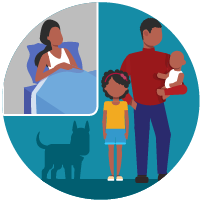
Separate yourself from other people and animals in your home
- Stay away from others: As much as possible, you should stay in a specific room and away from other people in your home. Also, you should use a separate bathroom, if available.
- Limit contact with pets & animals: You should restrict contact with pets and other animals while you are sick with COVID-19, just like you would around other people. Although there have not been reports of pets or other animals becoming sick with COVID-19, it is still recommended that people sick with COVID-19 limit contact with animals until more information is known about the virus.
- When possible, have another member of your household care for your animals while you are sick. If you are sick with COVID-19, avoid contact with your pet, including petting, snuggling, being kissed or licked, and sharing food. If you must care for your pet or be around animals while you are sick, wash your hands before and after you interact with pets and wear a facemask. See COVID-19 and Animals for more information.
Information for Household Members and Caregivers of Someone who is Sick
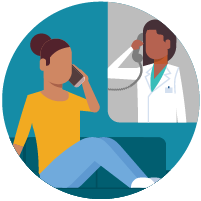
Call ahead before visiting your doctor
- Call ahead: If you have a medical appointment, call the healthcare provider and tell them that you have or may have COVID-19. This will help the healthcare provider’s office take steps to keep other people from getting infected or exposed.
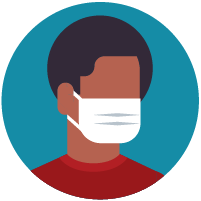
Wear a facemask if you are sick
- If you are sick: You should wear a facemask when you are around other people (e.g., sharing a room or vehicle) or pets and before you enter a healthcare provider’s office.
- If you are caring for others: If the person who is sick is not able to wear a facemask (for example, because it causes trouble breathing), then people who live with the person who is sick should not stay in the same room with them, or they should wear a facemask if they enter a room with the person who is sick.
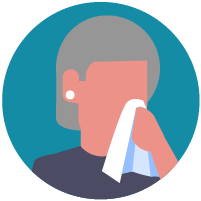
Cover your coughs and sneezes
- Cover: Cover your mouth and nose with a tissue when you cough or sneeze.
- Dispose: Throw used tissues in a lined trash can.
- Wash hands: Immediately wash your hands with soap and water for at least 20 seconds or, if soap and water are not available, clean your hands with an alcohol-based hand sanitizer that contains at least 60% alcohol.
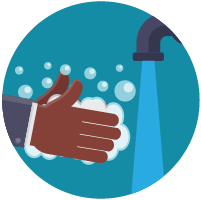
Clean your hands often
- Wash hands: Wash your hands often with soap and water for at least 20 seconds, especially after blowing your nose, coughing, or sneezing; going to the bathroom; and before eating or preparing food.
- Hand sanitizer: If soap and water are not readily available, use an alcohol-based hand sanitizer with at least 60% alcohol, covering all surfaces of your hands and rubbing them together until they feel dry.
- Soap and water: Soap and water are the best option if hands are visibly dirty.
- Avoid touching: Avoid touching your eyes, nose, and mouth with unwashed hands.
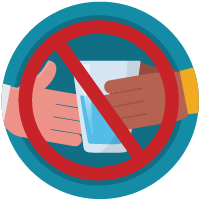
Avoid sharing personal household items
- Do not share: You should not share dishes, drinking glasses, cups, eating utensils, towels, or bedding with other people or pets in your home.
- Wash thoroughly after use: After using these items, they should be washed thoroughly with soap and water.
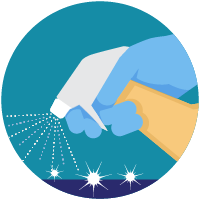
Clean all “high-touch” surfaces everyday
- Clean and disinfect: Practice routine cleaning of high touch surfaces.
High touch surfaces include counters, tabletops, doorknobs, bathroom fixtures, toilets, phones, keyboards, tablets, and bedside tables.
- Disinfect areas with bodily fluids: Also, clean any surfaces that may have blood, stool, or body fluids on them.
- Household cleaners: Use a household cleaning spray or wipe, according to the label instructions. Labels contain instructions for safe and effective use of the cleaning product including precautions you should take when applying the product, such as wearing gloves and making sure you have good ventilation during use of the product.
Complete disinfection guidance
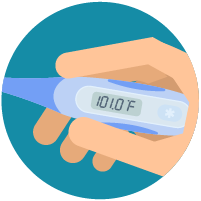
Monitor your symptoms
- Seek medical attention: Seek prompt medical attention if your illness is worsening (e.g., difficulty breathing).
- Call your doctor: Before seeking care, call your healthcare provider and tell them that you have, or are being evaluated for, COVID-19.
- Wear a facemask when sick: Put on a facemask before you enter the facility. These steps will help the healthcare provider’s office to keep other people in the office or waiting room from getting infected or exposed.
- Alert health department: Ask your healthcare provider to call the local or state health department. Persons who are placed under active monitoring or facilitated self-monitoring should follow instructions provided by their local health department or occupational health professionals, as appropriate.